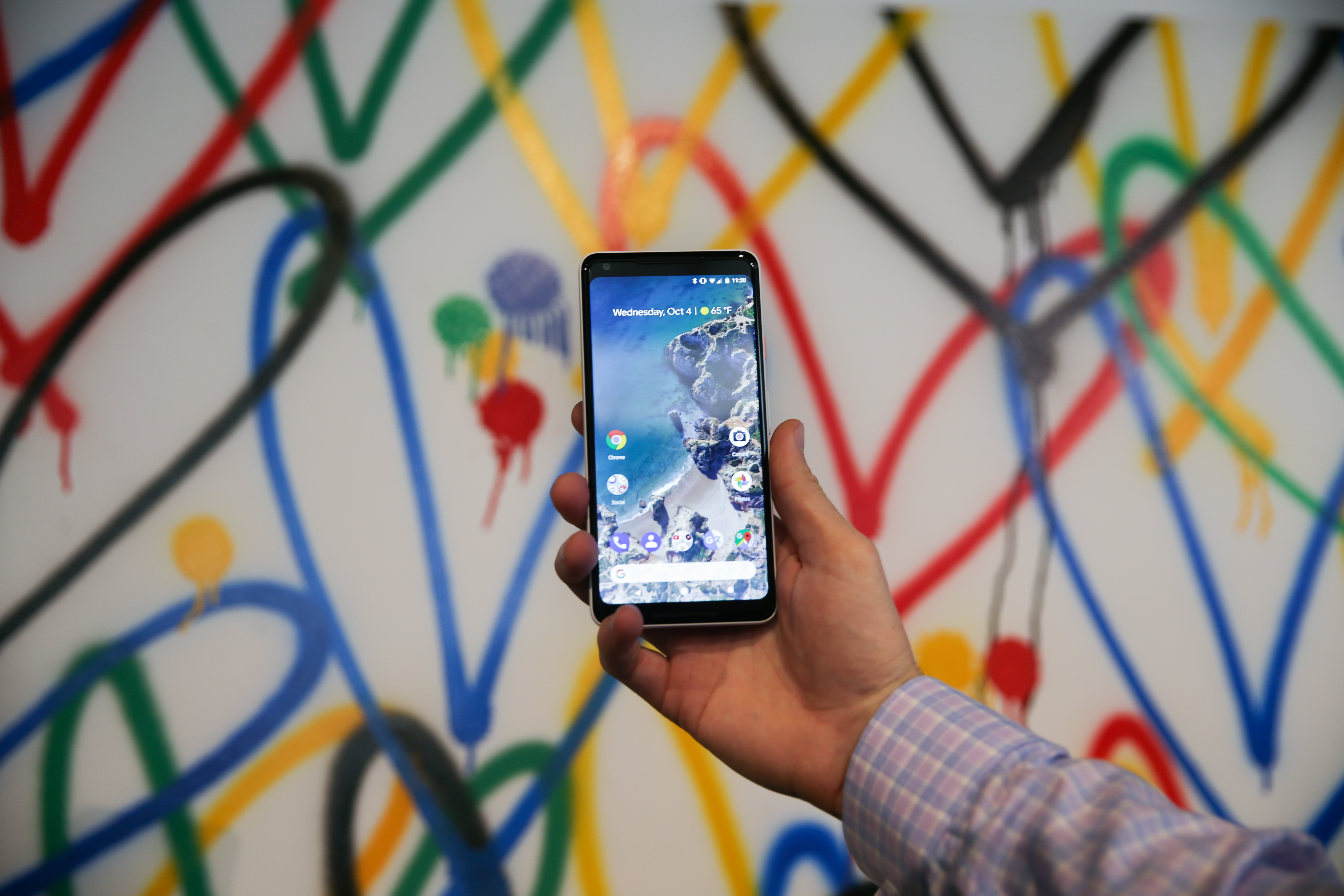The genius strategy behind Google's new Pixel 2 smartphones
This is about way more than a fancy new phone. It's about the company's future success.


Why does Google keep making hardware?
That might seem like an odd question, especially after the company just announced a slew of new products, including its flagship Pixel 2 smartphone. But the question is still a fair one. The original Pixel, the first smartphone designed entirely in-house by Google, was well-made and well-reviewed — but currently has just 0.7 percent market share in the U.S. In other words, it is completely dwarfed by the sales of Samsung and Apple phones. After years of even less success with its earlier Nexus line, the question remains: Why does Google keep plugging away at devices?
Google's answer revealed itself at the beginning of Wednesday's Pixel 2 event. "We believe we can make the smartphone experience better," said product chief Mario Queiroz. But to make the overall smartphone experience better, Google has to control every part of that experience, from the apps you use to the device itself. To do that, it has to make its own hardware.
The Week
Escape your echo chamber. Get the facts behind the news, plus analysis from multiple perspectives.

Sign up for The Week's Free Newsletters
From our morning news briefing to a weekly Good News Newsletter, get the best of The Week delivered directly to your inbox.
From our morning news briefing to a weekly Good News Newsletter, get the best of The Week delivered directly to your inbox.
In other words, Google wants to copy Apple — not in the pedestrian sense of smartphone features or even product ideas, but rather the vertically integrated business model, which has been a major facet of Apple's spectacular ownership of smartphone profits and mindshare. Google is no longer content to let other companies control its destiny. It wants to mimic the Apple way.
For years, Android was the Windows of the mobile world. Like Microsoft's operating system, Android ran on an enormous variety of hardware, from Samsung's high-end offerings to countless entry-level brands in China, India, and elsewhere. This strategy spread Android far and wide and not only allowed Google to gather enormous amounts of data, but eventually made the platform accessible to literally billions. Android is now the world's most popular computing operating system.
But the approach also carried an inherent tax: Every time someone picked up their phone and used Foursquare or Venmo or Facebook, Google's primary search business got left out. What's more, new features in Android had to be designed in partnership with other hardware and component makers, delaying their implementation, while Google had to wait for other companies to make devices as impressive or desirable as the iPhone. As just one example: It took Samsung a full six generations of its flagship Galaxy line to just match Apple's iPhone camera quality, let alone surpass it. Even now, Apple controls a full 80 percent of smartphone profits because it owns the profitable high end of the market where new features are most sought after.
So in a simple sense, the Pixel line is an attempt to cater to people who want an Android that is as capable or even better than the iPhone, and the Pixel 2 is the latest and greatest. The Pixel line's camera in particular has been hailed as the best, and the Pixel 2 promises to be even better, and is of particular import because cameras are especially valued by the coveted high-end consumer.
A free daily email with the biggest news stories of the day – and the best features from TheWeek.com
But a decade into the smartphone era, specifications aren't enough. When considering which phone to buy, consumers are no longer looking at a simple list of features; they're considering how all the parts work together to make a device — and the broader ecosystem — more compelling. Giving consumers the most effective experience requires vertically integrating hardware, software, and services so that the experience can be seamless. For example, technologies like Google Lens, which lets users identify objects using the camera, rely on a variety of things working perfectly — from the computing to the imaging tech to the machine learning. The Pixel 2's likely excellent camera also comes with free cloud storage from Google, making the device even more compelling. In mimicking this integrated Apple approach, Google can also leverage a key advantage over Apple: a head start in AI, as Apple has come to the field later and more clumsily than its competitors, while Google continues to be a pioneer.
The upsides of this holistic approach are clear: When a tech company controls each point in an ecosystem, it is better able to produce the very best experiences for users, and evade the pitfalls and lag of tech partnerships. It's something the entire industry is slowly recognizing. Google also announced the Google Pixelbook, a high-end Chromebook with a touchscreen and pen. It instantly evoked both the Microsoft Surface and the iPad Pro. The eerie similarity was symbolic: All three major computing companies are trying to achieve the same basic thing, locking consumers into an ecosystem.
There is a problem looming here for Google, though. In theory, the Pixel line is supposed to function like Microsoft's Surface in that it highlights the company's ecosystem at its very best, spurring on development from its broad range of partners. But inevitably, there are competing interests at work. Samsung is also recognizing that power lies in the stack; it developed its own voice assistant called Bixby rather than relying on Google's Assistant. You can, however, access both services on a new Samsung phone. It's redundant, and a little ridiculous, but perhaps demonstrative of the tension at work. Where once there was overlap and cross-pollination, things are tightening into vertical silos, and partnerships are a thing of the past. What remains to be seen is whether Google can keep on this path without alienating its partners — or, if push comes to shove, have Android continue to succeed on its own without them.
Navneet Alang is a technology and culture writer based out of Toronto. His work has appeared in The Atlantic, New Republic, Globe and Mail, and Hazlitt.
-
 The pros and cons of noncompete agreements
The pros and cons of noncompete agreementsThe Explainer The FTC wants to ban companies from binding their employees with noncompete agreements. Who would this benefit, and who would it hurt?
-
 What experts are saying about the economy's surprise contraction
What experts are saying about the economy's surprise contractionThe Explainer The sharpest opinions on the debate from around the web
-
 The death of cities was greatly exaggerated
The death of cities was greatly exaggeratedThe Explainer Why the pandemic predictions about urban flight were wrong
-
 The housing crisis is here
The housing crisis is hereThe Explainer As the pandemic takes its toll, renters face eviction even as buyers are bidding higher
-
 How to be an ally to marginalized coworkers
How to be an ally to marginalized coworkersThe Explainer Show up for your colleagues by showing that you see them and their struggles
-
 What the stock market knows
What the stock market knowsThe Explainer Publicly traded companies are going to wallop small businesses
-
 Can the government save small businesses?
Can the government save small businesses?The Explainer Many are fighting for a fair share of the coronavirus rescue package
-
 How the oil crash could turn into a much bigger economic shock
How the oil crash could turn into a much bigger economic shockThe Explainer This could be a huge problem for the entire economy



